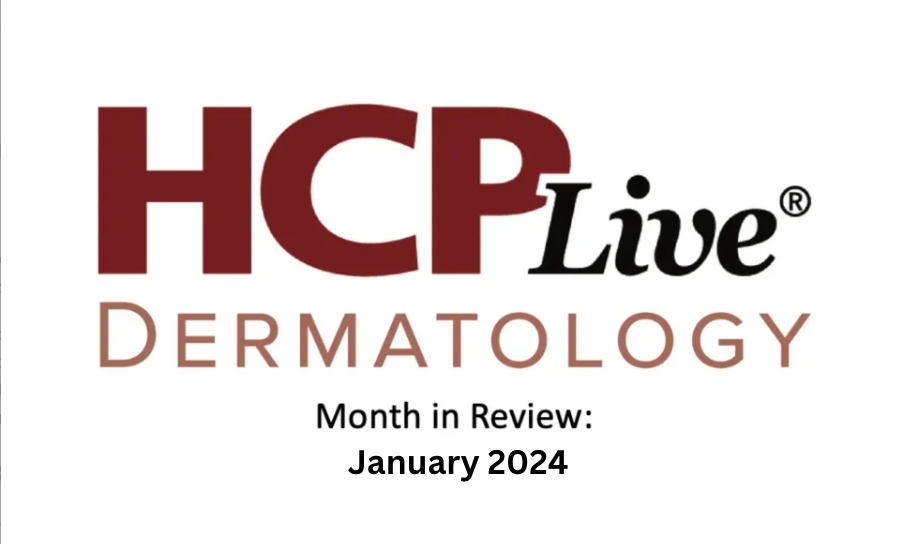Dermatology Month in Review: January 2024
January’s Dermatology Month in Review features 2 major FDA decisions, positive results on a new assessment tool, an evaluation of climate change’s impact on eczema, and more.

In the first month of 2024, the field of dermatology showed no signs of slowing down, as new research, conferences such as Winter Clinical, and new decisions by the US Food and Drug Administration (FDA) all became woven into the story this January.
January ended up being an eventful month, with several major FDA decisions, findings on an assessment tool for prurigo nodularis, an assessment of information gaps on climate change’s impact on eczema patients, and more being highlighted in our review of this month’s biggest dermatology stories.
FDA Approval of Topical Berdazimer Gel Announced for Molluscum Contagiosum
In one of the major stories of the month, topical berdazimer gel (Zelsuvmi), 10.3%, by Ligand Pharmaceuticals, Inc., was approved by the FDA for pediatric and adult individuals aged 1 year and older with molluscum contagiosum (molluscum). The new molluscum drug was significant in the field of dermatology due in part to the lack of molluscum drugs.
“The approval of (berdazimer gel) is a breakthrough, marking the first time that clinicians can treat molluscum with an efficacious topical prescription medication that is applied by the patient, or a family member,” Mark D. Kaufmann, MD, FAAD, of the Icahn School of Medicine at Mount Sinai, said in a statement.
Long-Term Efficacy of Risankizumab Observed for Psoriasis Regardless of Disease Characteristics
Another major story in January was that of the new findings from the LIMMitless open-label extension study, led by Dr. Bruce Strober at Yale University's dermatology department, which showed that risankizumab exhibits enduring efficacy for patients with psoriasis past 52 weeks.
The extension study, spanning 256 weeks, suggested consistent efficacy over several different patient subgroups. Significantly, the long-term efficacy of risankizumab past 52 weeks, based on patient characteristics at the beginning, had not been reported on in prior research.
New Patient-Reported Assessment Tool Validated for Use with Chronic Prurigo
One significant study covered in January was one in which investigators introduced a newly-developed and validated, 5-item assessment tool known as the Prurigo Control Test (PCT) for assessing disease control among those with chronic prurigo, including prurigo nodularis.
The validation of PCT in the study indicated it is the first patient-reported outcome measure specifically crafted for assessing disease control in this population. In future assessments, its application could assist clinicians in formulating decisions in treatment for patients dealing with chronic prurigo.
FDA Updates Dupilumab Label Supporting Use Among Atopic Dermatitis Patients with Hand, Foot Involvement
Regeneron Pharmaceuticals, Inc. and Sanofi also announced in January that there had been an update by FDA officials regarding the use of dupilumab (Dupixent) in treating atopic dermatitis patients. The agency, as of January 16, modified the efficacy and the safety information, specifically aimed at eczema patients aged 12 and above with uncontrolled disease featuring moderate-to-severe hand and/or foot involvement.
This revision of use was preceded by new phase 3 data that suggested those treated with the drug experienced clearer skin at a rate twice as high as individuals on a placebo. Furthermore, 4 times as many individuals treated with the drug showed improvements in itch compared to those in the placebo arm of the study.
Climate Change and Eczema: Spotlighting Hazards, Trends, Gaps in Awareness
https://www.hcplive.com/view/climate-change-and-eczema-spotlighting-hazards-trends-gaps-in-awareness
Another analysis posted in January highlighted 18 studies which provided data on the ways in which climate change affects atopic dermatitis. The study showed that climatic hazards led to direct impacts, such as worsened symptoms due to particulate matter from wildfires, and indirect impacts, such as food insecurity resulting from droughts leading to eczema.
“Although AD frequently presents in childhood, it may resolve, persist, or first present in adulthood,” Katrina Abuabara, MD, of the department of dermatology at the University of California San Francisco, said in a statement. “It is important to understand the current and potential future impact of climate change on AD because environmental factors have been repeatedly shown to influence disease onset and course.”
Abuabara and her team of investigators not only assessed hazards, data, and research gaps but also formulated maps to better assess the historical, current, and future anticipated effects of climatic issues on the worldwide prevalence of atopic dermatitis.